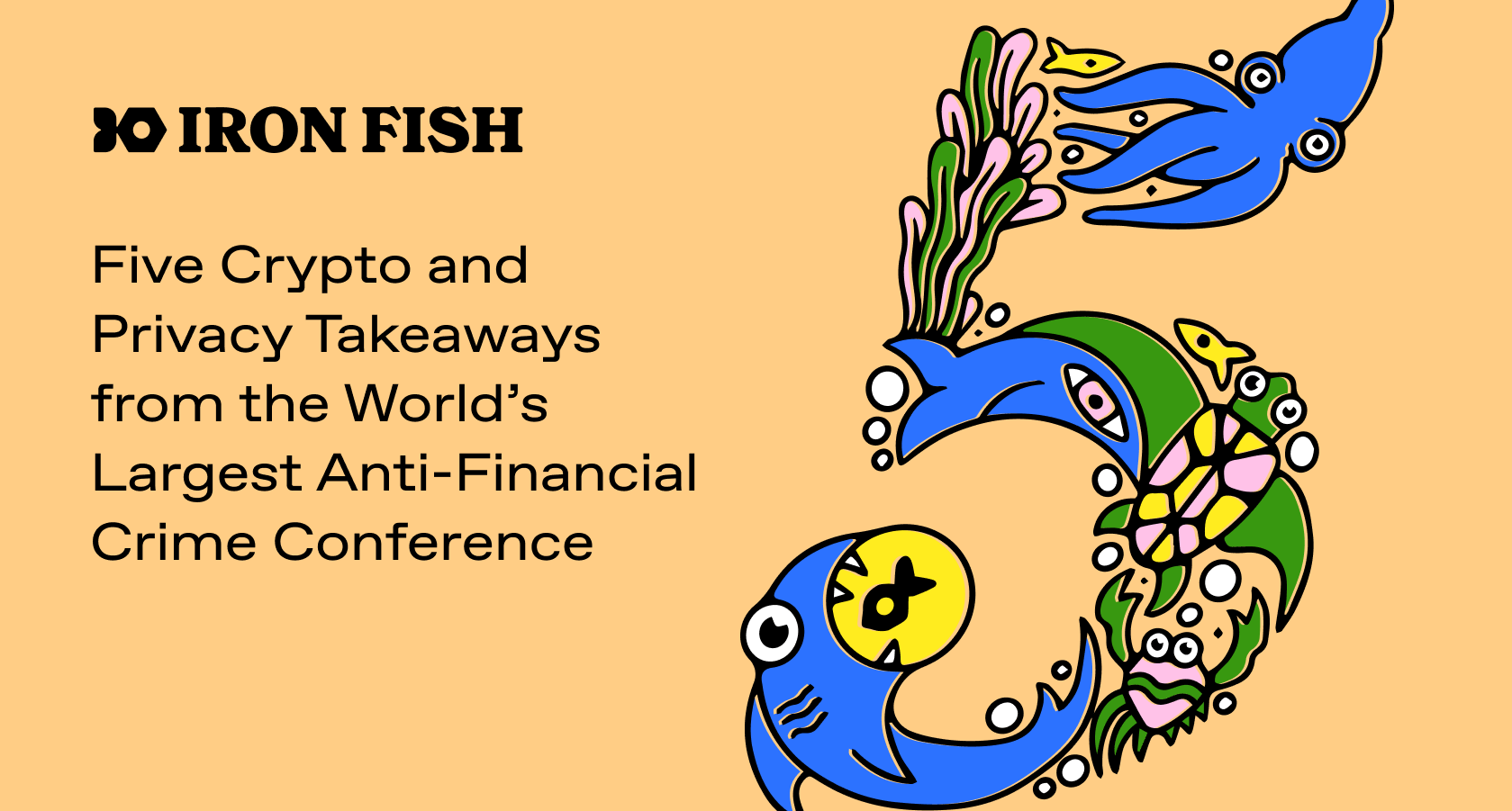Takeaways from the World’s Largest Anti-Financial Crime Conference

What do people in government, law enforcement, and anti-financial crime think about crypto and privacy?
I had a chance to find out at the largest anti-financial crime conference in the world - ACAMS Las Vegas. ACAMS is an organization of anti-financial crime professionals with over 100,000 members worldwide. Its flagship event is a three-day conference in Las Vegas (this year October 11-13) that brings together thousands of anti-financial crime professionals with senior regulatory and law enforcement officials to discuss the latest trends and techniques for fighting financial crime.
Takeaway #1: There is a lot of interest in crypto
ACAMS Las Vegas covers financial crime in all of its forms. While only a small percentage of financial crime involves crypto and many traditional financial institutions don’t offer crypto products or services, crypto got a lot of attention at ACAMS Las Vegas. I’d estimate that about 25% of the agenda was dedicated to crypto-related topics. And, anecdotally, the crypto sessions were amongst the most well-attended.
Takeaway #2: More anti-financial crime professionals are using crypto
On day one of the conference, I moderated a session on crypto financial crime risk with panelists from Coinbase, Anchorage Digital, TRM Labs, and Wells Fargo. I polled the audience of several hundred people and asked how many had personally bought or used cryptocurrency. Approximately 50% had and another 30% had not yet but were likely to do so in the future.
This appears to be part of a larger trend. On the same day that I was polling the audience in Las Vegas, Bank of America released a study on the changing attitudes of younger investors. In the study, Bank of America found that 75% of investors aged 21 to 42 don’t believe it is possible to earn above-average returns in stocks and bonds. Crypto is the area that these investors believe offer the greatest opportunity for growth. The study also found investors aged 21 to 42 are 7.5 times more likely to hold crypto in their portfolios than older investors and 5 times more likely to say they understand it quite well.
The number of people buying and using crypto will almost certainly go up as they start to see more projects with real-world utility (like Iron Fish!) and stop thinking of crypto as just a speculative investment.
Takeaway #3: Most anti-financial crime professionals think crypto risk can be appropriately mitigated with the right controls
Last month, JPMorgan CEO Jamie Dimon called cryptocurrencies “decentralized Ponzi schemes.” Anti-financial crime professionals disagree. In the same ACAMS Las Vegas poll, 80% of respondents believe that the financial crime risk associated with crypto could be appropriately mitigated with the right controls. Nearly 20% believe that crypto is less risky from a financial crime perspective than traditional financial services.
It also seems that JPMorgan, as a company, might disagree with its CEO. Just this week, JPMorgan hired its first head of crypto regulatory policy.
Takeaway #4: Many still think pseudonymity equals anonymity
On more than one occasion, I heard the term pseudonymity used interchangeably with anonymity. Many people didn’t seem to understand just how easy it can be to overcome pseudonymity and connect a pseudonymous wallet address to a real person.
One example I used that seemed to resonate involved three off-chain payments that I recently made where, if I had made them on-chain from a pseudonymous wallet, it would be pretty easy to connect that wallet back to me. The three payments were to the parents association at my son’s elementary school in Virginia, for a shirt at the University of Michigan’s official clothing store, and a Starbucks coffee at the Aria Casino (venue for ACAMS Las Vegas). How many people do you imagine there are in the area zoned for our elementary school, that are at an age where they could be parents of an elementary school child, have a connection or interest in the University of Michigan, and were at the Aria Casino in Las Vegas last week? Using data analytics and other publicly available information, it would be pretty easy to connect that wallet to me. And if you couldn’t narrow it down to me after just these payments, it would only take a few more to get there. Then, once you know that wallet belongs to me, you know the assets that I have in my wallet, can see every transaction I’ve ever made – including the counterparty wallets! – and have the ability to track me in near-real time with every transaction I make going forward.
The fact is, blockchain pseudonymity is very easily overcome. And the more data that’s out there, the easier it is. But based on my interactions at ACAMS Las Vegas, there are still a lot of anti-financial crime professionals and people in government and law enforcement that don’t yet understand this.
Takeaway #5: Anti-financial crime professionals, including law enforcement, believe in the importance of privacy, but they are afraid that privacy in the crypto space will allow criminals to go unchecked
The job of law enforcement, and anti-financial crime professionals to a lesser extent, is to protect all of us from criminals. And that’s a really hard job. Especially as criminal organizations get more and more sophisticated. ACAMS attendees see money from crypto hacks going to North Korea and imagine North Korea using that money to create weapons of mass destruction that could kill innocent people.
At the same time, anti-financial crime professionals and people in law enforcement understand and believe in the need for privacy. To protect themselves and their families from potential retribution from criminals, many in law enforcement take steps beyond what a regular person might do to protect their privacy. So when it comes to privacy, they get it. But they are afraid that if you bring more privacy to crypto, they won’t be able to do their jobs and criminals will go unchecked.
Bringing more privacy to crypto while at the same time making it difficult for rogue regimes, terrorists, and criminals to exploit it is one of the great problems that must be solved for crypto to reach its true potential. This is why what we are trying to do at Iron Fish is so important. We believe that we can do both. I hope that after a week at ACAMS Las Vegas, more of my colleagues can see that if we can accomplish this, we can help make the world a better and safer place.
